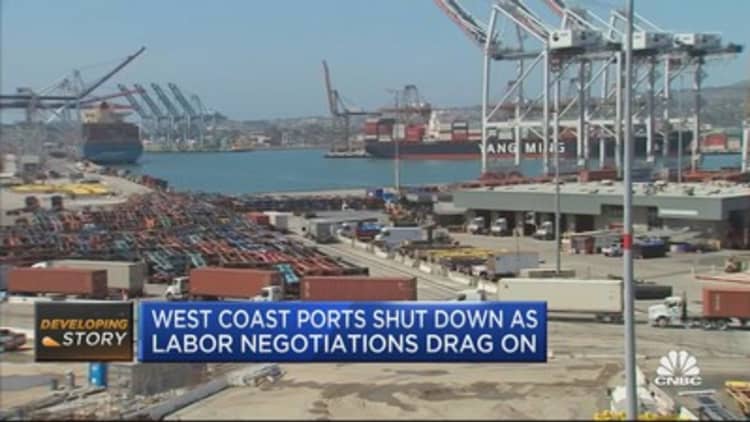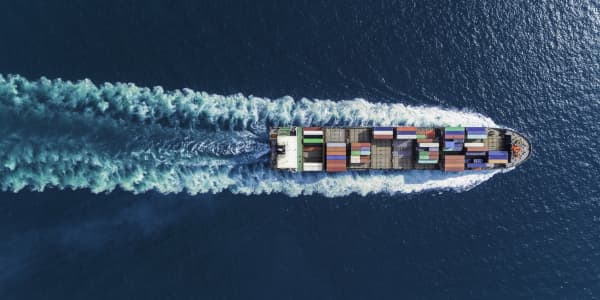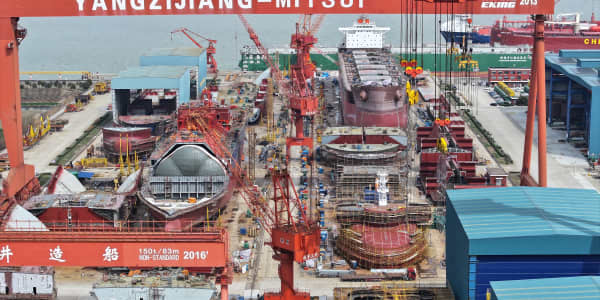President Biden's Acting Labor Secretary Julie Su is in current communication with labor and port management representatives in an effort to help broker a deal at a time of rising tensions at ports up and down the West Coast.
Su, who served as secretary for the California Labor and Workforce Development Agency until 2021, has longstanding relationships with both sides, and is helping to maintain communication at the bargaining table and move towards a final contract between the International Longshore & Warehouse Union and Pacific Maritime Association.
The Department of Labor confirmed Acting Secretary Su's involvement, but declined further comment.
President Biden nominated Acting Secretary Su on February 28 to replace Labor Secretary Marty Walsh, who stepped down in March. Su has the backing of many labor unions, including the United Mine Workers, NABTU, LiUNA, the IBEW and AFL-CIO, but has also received support from business leaders, including a group of 250 executives who sent a letter to the Senate backing her nomination, as well as the Los Angeles Chamber of Commerce. She was previously confirmed by the Senate to serve as the deputy secretary of labor on July 13, 2021.
The calls from industry for the Biden administration to intervene in the West Coast port situation have been increasing, from the National Retail Federation to the National Association of Manufacturers and U.S. Chamber of Commerce, which voiced its concerns in a statement last Friday about a "serious work stoppage" at the ports of Los Angeles and Long Beach which would likely cost the U.S. economy nearly half a billion dollars a day. It estimated a more widespread strike along the West Coast could cost approximately $1 billion per day.
"The best outcome is an agreement reached voluntarily by the negotiating parties. But we are concerned the current sticking point – an impasse over wages and benefits – will not be resolved," U.S. Chamber of Commerce CEO Suzanne Clark wrote in a letter to President Biden.
Supply chain fears are running high from trucking to rails and ocean carriers. Billions of dollars in cargo has been held up off ports, container congestion and delays have led to longer service and turnaround times. Further complicating the crisis planning for logistics firms was a landslide vote by ILWU Canada workers to authorize a strike at Canadian West Coast ports, and low water levels at the Panama Canal, which make the option of alternate trade routes on both the West Coast and the East Coast ports more difficult.
Logistics managers trying to navigate the growing port congestion said involvement from the Biden administration is welcome news, but the on-the-ground situation at ports remain stressed and financial consequences, such as late penalties, are becoming more likely.
"We are not getting the effective turns of our drivers," said Paul Brashier, vice president of drayage and intermodal at ITS Logistics. "Even if a terminal is saying they are operating and it's so slow, we can be charged with demurrage charges."
The Pacific Maritime Association claimed that "intentional" slowdowns by the ILWU continue, according to a statement it put out on June 10.
The ILWU declined to comment.

Negotiations between the PMA and ILWU are said to have reached a stalemate over issues including wages and automation. While both parties claimed major progress during the spring, recent actions were described by the ILWU as rank-and-file union workers "voicing their displeasure."
"We aren't going to settle for an economic package that doesn't recognize the heroic efforts and personal sacrifices of the ILWU workforce that lifted the shipping industry to record profits," ILWU International President Willie Adams said in a recent statement.
According to the PMA 2022 report, full-time ILWU workers on average were paid $211,000. ILWU foremen who oversee the longshoremen earned a little over $300,000.
ILWU has pointed to $500 billion in profits made by ocean carriers and terminal operators during the past two years, though as supply chain prices have declined, those profit levels have come down.
Port of Seattle tops list of West Coast port congestion
While there have been issues at ports up and down the West Coast, including California's biggest ports in Los Angeles, Long Beach and Oakland, the Port of Seattle has topped the congestion list. The SSA Terminal let labor go home at lunch Monday through Friday of last week due to slow work. On Saturday, the entire port was shut down after labor was not filled.
The lack of labor moving containers on and off vessels has delayed containerships as ships remains at berth — at a dock — in the Seattle port. The Maersk Cairo has been at berth since June 3; the APL La Havre since June 5, and the Maersk Cardiff and Etoile both docked since June 8.
As of Monday afternoon, six containerships were currently at anchor, according to MarineTraffic, with four containerships inbound from the sea and due to arrive within the next seven to nine days. All terminals have vessels parked, and no new space.
"Seattle is experiencing the most impact," said Captain Adil Ashiq, head of MarineTraffic North America. The average turnaround times for containerships at Seattle has been up to 2.5 days in the past few months, nearly four times the average, according to MarineTraffic, which Ashiq said, "poses a significant threat to imports waiting to offload and get to where they need to be."
The Port of Tacoma, which makes up the other half of the Northwest Seaport, is facing similar backlogs. Nine vessels are inbound from sea with five vessels arriving in the next four days. Two vessels are still at berth, one of them the YM Totality, which has been at berth since June 8. The Port of Tacoma container terminal continues to operate, but at 50 percent.
"We are afraid of the stacking up of vessels and ocean carriers skipping ports," Brashier said. "We have clients asking to book to the East Coast and Gulf instead of the West Coast. The next four to six weeks you'll see a ton of freight stacking up at the Panama Canal."
The backup of vessels at the Ports of Oakland, Long Beach, and Los Angeles continues, with four vessels waiting offshore 70 nautical miles from the Port of Oakland, and nine total vessels heading to Oakland from sea.
The Port of Long Beach currently has 19 containerships inbound from sea heading to the port, four scheduled to arrive within the next two days. A larger wave of five vessels is scheduled to come in at the same time on June 19, according to MarineTraffic. Thirty-seven containerships are currently on their way to the Port of Los Angeles, with seven to arrive within the next 12 hours near the anchorage area, and eight arriving from the sea within the next 5 days.
"We can see the impact recent events are having on vessel schedules as there are vessels still at berth who arrived 4 days ago, nearly at the peak of the max turn around time," Ashiq said. He cited one ship, the Maersk Antares, which arrived eight days ago and spent nearly double the time at berth than the average.
For the first time in months, Captain J. Kipling (Kip) Louttit, executive director of Marine Exchange of Southern California, reported schedule delays. "The YM Uniform was to depart at 0400 today and slipped 48 hours to 0400 Wednesday 14 June. We'll keep you advised as we get more," he wrote in an email. Later on Monday he sent a further update with three more ship delays. "We don't have certainty of reason," he stated.





